The CBD Expert Series: Putting CBD Lab Tests to the Test with Tyler D’Spain
CBD companies can have their products tested by third-party laboratories to verify the purity and potency of their product. But is that enough? In an industry that is still largely unregulated, it’s become apparent that even independent lab testing needs independent lab testing.
That’s where Ellipse Analytics comes in. The lab hits the front lines of the CBD marketplace, testing products that consumers like you are buying, right off the shelf or online. Recently, we spoke to Ellipse Analytics Lab Director Tyler D’Spain about their process for CBD product testing and the shocking results they’ve produced.
Can you give us some background on Ellipse Analytics and how you got into CBD testing?
I came from a marijuana testing laboratory. I co-founded Aurum Labs down in Durango, Colorado, which provides the traditional pay-for-service analytical testing. This is where I first identified a problem. When you’re in a marijuana testing laboratory, the client has to submit samples for testing so that they can prove regulatory compliance. The problem in a state like Colorado is that the manufacturer gets to select the sample that they send to a lab.
In Colorado, one of the known issues with no good solution has been that because the marijuana producers choose the sample, they send what they want tested in the lab. The potential for that product to be tampered with is extremely high. The only thing you can really rely on is trusting the manufacturer, trusting the cultivation, trusting the extraction facility or the product manufacturer to not send the samples that are misrepresenting their batches.
This is an issue that is alive and well, unfortunately.
Where Ellipse Analytics differs is we get to do what we wish we could have done at the marijuana testing lab, which is we actually go to the store. We go online, we try to get our products for testing in a manner that’s most representative of the way the consumer is going to get that product.
In Colorado, one of the known issues with no good solution has been that because the marijuana producers choose the sample, they send what they want tested in the lab.
We'll look at Nielsen and other consumer reports to identify what the most popular products are. So, if you were the consumer, what are you most likely to buy? And then we'll use the same channels, whether that's buying the product off Amazon, buying it direct-to-consumer from a manufacturer, or even going to the physical store to purchase that product in person. Because in reality that's how you're going to go to the store and buy it. We go out and we purchase it so we have receipts of anything that's been purchased by us.
How do you test the products once you have them?
We test everything blind, which is how it always should be in an analytical lab. We have a technician that's responsible for taking the CBD product from its branded packaging down into a blinded sample container. Once we have those products blinded, we then process them through the lab just like we do any other sample.
We score CBD products based on their label claim accuracy, their purity, and take all those metrics into account. We have the capacity to test CBD products for 300-plus pesticides, many different plasticizers, heavy metals, minerals, mycotoxins, really all of the contaminants that you would hope a lab tests for, and some that most people don't think about. In total, we typically test for between 300 and 400 different contaminants.
On every product that we test, we aggregate the results and then we effectively grade those products on a curve; so, CBD tinctures versus CBD tinctures or CBD pet treats versus CBD pet treats. Then, we'll compare them across all the contaminants that we measure. We create an independent algorithm for CBD tinctures to compare and grade those against each other to identify which products are truly superior.
Based on your testing, which CBD brands would you recommend?
Oh. That is a question I get far too often. Unfortunately, the answer is in a product that's sort of in the works right now. We have another business we're forming to be the front end for that data. We’re working closely with a few other companies on PureMarket, which is effectively the front end where our test results are going to be based.
The intent of that website is going to be giving you letter scores for any product that we test. So, when we test the category, we want to provide a market experience where it's cultivated product choices that are intended to give you your best options.
What about the CBD brands that score low test results?
Unfortunately, our lab’s role is to identify some of the problems. But sometimes you have to be a problem identifier rather than a problem solver. It’s in our business to help identify the problem and let the public know that you can't just go to the store and buy a product that's labeled CBD and assume you know what's inside of it. Part of it is consumer awareness and part of it is going to be providing a little bit of exposure on the brands that are practicing poor business practice.
What is the “chain of custody” and how does it pertain to CBD?
The chain of custody varies a little bit depending on its definition of use. But in our context, the chain of custody starts from the time and place a CBD sample is purchased and follows how that sample is transported to and accepted into the laboratory, and then tracks through the testing process.
Typically, applications in legal or standards say marijuana testing, which typically involves the chain of custody from a grow facility to a product manufacturer, lot coding, batch tracking, and through to production. And then that sample being transferred from the production facility to a testing lab.
So, it's really the record and chain of receipts of any transfers of that product, showing whose hands it's touched and where it could have potentially been tampered with.
Unfortunately, our lab’s role is to identify some of the problems. But sometimes you have to be a problem identifier rather than a problem solver.
Why should we care about that as consumers?
Sample integrity. And for test results to be valuable, you really have to know if you can trust that the result you see is representative of the product that you're going to say purchase or consume.
What does that mean for folks at the grocery store as they're comparing CBD products? What should they be looking for? How do they apply chain of custody?
Unfortunately, it's a little late at that point and it's really one of the holes in the industry. It really comes down to brand trust, unfortunately. It takes a lot for the consumer to really know, can they trust the results?
A lot of CBD companies have taken the step of say putting a QR code on their package. I think that's a great first step, especially with the ease of access. You point your smart phone camera at the QR code, and it should take you right to those test results online. If you can trust that company, which we all hope we can, then you should be able to trust that those CBD test results are going to be representative of the product that you just purchased.

If you come across a CBD product with a QR code, you can access its test results by scanning the code with your smartphone camera.
Then, the test results should be useful with their intent. We sort of play police in the background, at least in analytics—we like to go and verify the results. The original name for our company was Third Party Validation and Verification. With that intent, we go out and double check.
So, whether it's your food companies, supplement manufacturers, pet food manufacturers, we really just play the role of double checking and saying can you or can you not trust these companies? The CBD industry is interesting because there really is a split. Some brands we go in and look at the Certificates of Analysis, and our tests results matched their test results dead on, which is great to see.
Unfortunately, we found that probably 40% or less of the CBD companies were really in that realm of accurate reporting. Their lot codes were transparent, and it was really easy to snap a picture and go online where we found the test results were true and representative of the product. The hope is that that is where every company is. But unfortunately, at this point, that's not really where the industry is at.
So where do you think the CBD industry is? Or where should the industry be heading when it comes to testing CBD?
No industry is 100% but I think that if the target is 80 plus 90 plus percent of CBD companies providing clear access to test results, showing their batch records, making information easily accessible, and being willing to add additional information where it's needed for the customer to be able to understand and interpret the results. I think that's where things need to go. Unfortunately, I would guess that we're still a couple of years away from that and it may take additional regulation either on the state- or federal-level to force companies to actually show or keep those records. We found that probably 40% or less of the CBD companies were really in that realm of accurate reporting.
Because there isn't federal oversight and all the CBD companies have to more or less play in a gray area, it's a lot easier to get away with a little bit of the shady practices. When it comes to state oversight, I think marijuana is a good example. Marijuana say, in Colorado where we're at is nothing like what marijuana was five years ago. It’s really owed to the state stepping in, helping to put systems in place for tracking and monitoring the product, doing seed to sale tracking, licensing laboratories to actually test those products, and providing oversight and certification.
Can CBD products be tested at these state-certified laboratories?
You know, they've unfortunately put a bit of a split in the industry where recreational marijuana testing labs, which are really the trusted labs, can't take hemp if it hasn't been grown in Colorado. And a lot of the companies that are in the hemp industry grow in other states like Oregon. They grow there, they extract there, but the business is in Denver and now they can't test their product because it was grown in Oregon.
Would you encourage someone to purchase CBD oil extracted from hemp grown in Colorado over say, hemp grown in Oregon or Kentucky?
Honestly, from what we've seen, it matters less where it's grown and more the quality of the manufacturing facility.
Really?
Yeah. When it comes down to it, and you put CBD isolates against CBD isolates, which is the most fair comparison, if a company can make it well, they can make it well. When you get into the broad-spectrum and full-spectrum CBD products, the biggest comparisons we see are whether they’re selling you a “THC-free” broad spectrum product that actually has THC in it, which unfortunately, is a huge problem.
I think the most interesting thing that I've seen is in full-spectrum products. The hemp grown in Kentucky seems to have the most interesting and diverse cannabinoid profiles. You know, not to tout Kentucky, but that was sort of a unique thing that I found in the data that we collected. But there was no state that was clearly better than the other states from a purity perspective.

The cannabis plant contains over 100 cannabinoids, including THC and CBD, each with their own properties and potential benefits.
Why do you think Kentucky-grown hemp has such a unique cannabinoid profile?
It's a really great question. I have not figured out why that is. I think part of it is the lineage of hemp that's available in Kentucky. They have been growing hemp for a long time and I think that has a lot to do with it.
The hemp grown in Kentucky seems to have the most interesting and diverse cannabinoid profiles.
You know, working with some hemp farms in my past, a lot of states are using the same cultivar providers of hemp. And as far as I can tell, Kentucky seems to have unique cultivars that other states just don't have.
What are cultivars?
In marijuana, a cultivar is typically called a strain. So although the plant itself is always Cannabis sativa, the cultivars are sub-bred lines of genetics. Ideally a cultivar is something that can be reproduced with consistent cannabinoid profiles and consistent properties, which define how they're different from one another even though effectively they’re still part of the same genus and species.
I think states need to gain more general acceptance and have a little bit more regulation in place for traceability before the CBD industry can get past that current “Wild West” state that it's in, which is really where marijuana was five years ago.
If there's one thing you wish people knew about CBD, what would it be?
It's be very cautious of claims. There's not a lot of research to substantiate a lot of the health claims that are being made. I see CBD—and hemp itself—as being a topic and a product that you have to step very carefully around. We're going to have to do a lot more research in the medical field to figure out where it's actually useful. But you have to be really careful as a consumer. If you see a CBD product making strong claims, I would be wary of it.
We've seen the FDA warn more than one CBD company about making claims…
Yeah. I think most people at this point are fairly familiar with the Curaleaf incident. It's just one example of how easy it is to put poor information out there. It’s unfortunate because at this point, the consumers are not educated enough to know that they shouldn't trust those claims.
If you have a health issue, if you're receiving treatment for something, it's best to be honest with your doctor. Just tell them what you're doing. Don't try and hide it because you feel like it might be illegal. The more information they receive, the more doctors might actually realize that, Oh, this really does seem to work with pain, or Oh, this really does seem to work for sleep. But if you're hiding information from a physician, you're really just endangering yourself.
You want to be able to buy a product where if it tells you something on the label, you can believe it. CBD is a minefield of misinformation and uncertain answers to questions.
More Expert Series Interviews
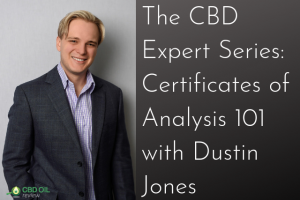
The CBD Expert Series: Jackie Bowen on Mislabeled & Misleading CBD Oil
Read More
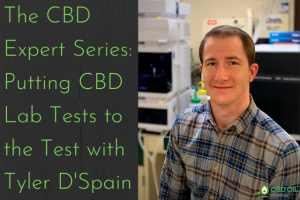
The CBD Expert Series: Putting CBD Lab Tests to the Test with Tyler D'Spain
Read More
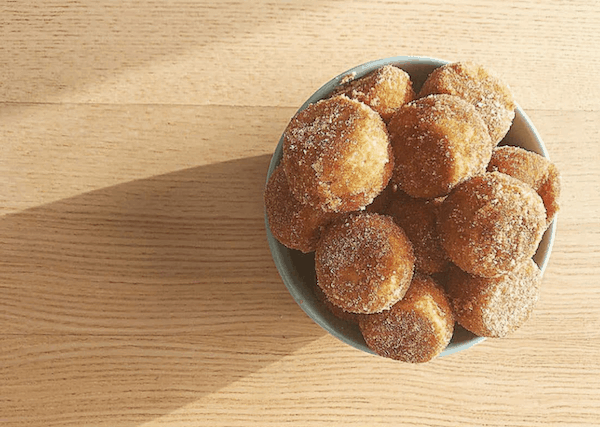
MasterChef Nick Nappi's CBD Apple Cider Donut Hole Recipe
Read More
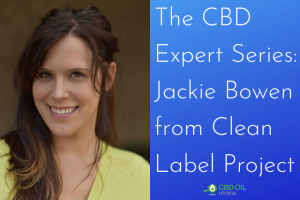
The CBD Expert Series: Jackie Bowen from Clean Label Project
Read More

The CBD Expert Series: Certificates of Analysis 101 with Dustin Jones
Read More
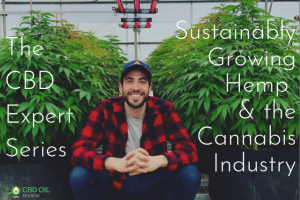
The CBD Expert Series: Sustainably Growing Hemp & the Cannabis Industry
Read More
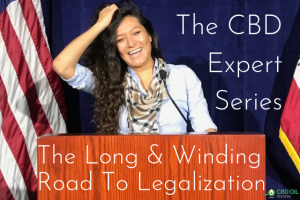
The CBD Expert Series: The Long & Winding Road To Legalization
Read More
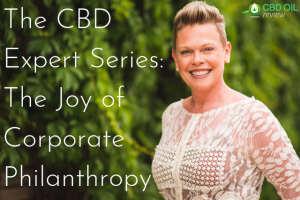
The CBD Expert Series: The Joy of Corporate Philanthropy
Read More
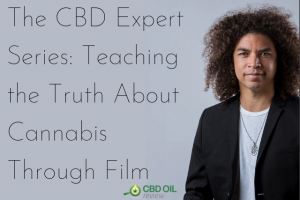
The CBD Expert Series: Teaching the Truth About Cannabis Through Film
Read More
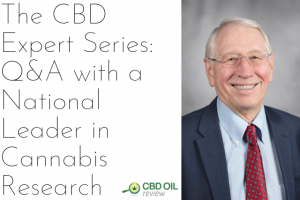
The CBD Expert Series: Q&A with a National Leader in Cannabis Research
Read More

The CBD Expert Series: Sexual Health and Pleasure with Sex Educator Kiana Reeves
Read More
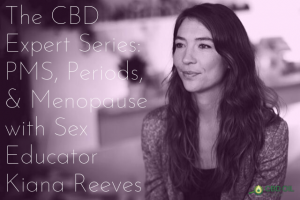
The CBD Expert Series: PMS, Periods, & Menopause with Sex Educator Kiana Reeves
Read More
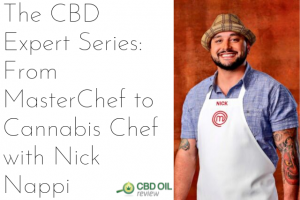
The CBD Expert Series: From Masterchef to Cannabis Chef with Nick Nappi
Read More
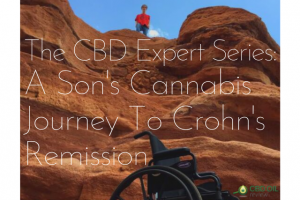
The CBD Expert Series: A Son's Cannabis Journey To Crohn's Remission
Read More
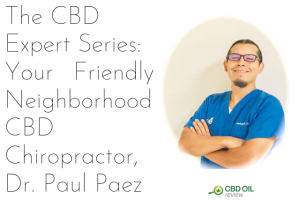
The CBD Expert Series: Your Friendly Neighborhood CBD Chiropractor, Dr. Paul Paez
Read More
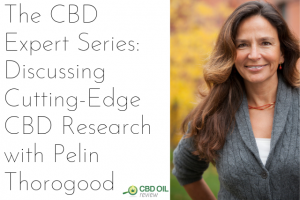
The CBD Expert Series: Discussing Cutting-Edge CBD Research with Pelin Thorogood
Read More
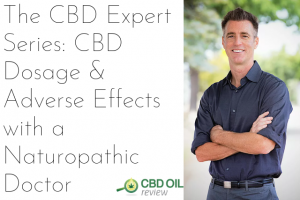
The CBD Expert Series: CBD Dosage & Adverse Effects with a Naturopathic Doctor
Read More

The CBD Expert Series: Talking Drug Tests with a Lab Tech
Read More
Opinions expressed in this article are those of our guest (the interviewee) and not necessarily of CBD Oil Review.
6 Smart Questions to Ask BEFORE You Buy CBD
Get the Ultimate CBD Buyer’s Guide and you won’t look at CBD the same way again!



 search
search